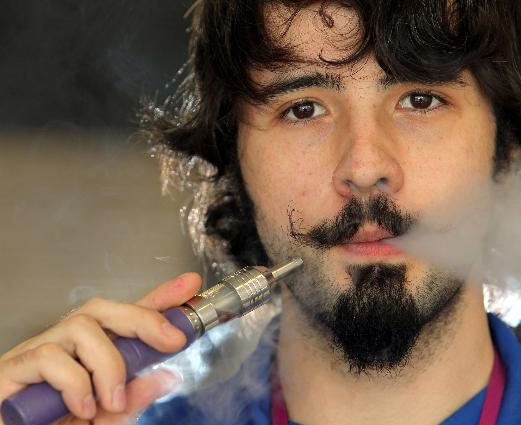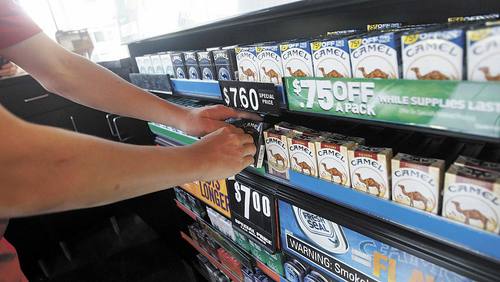Grand Forks Herald: Ballot proposal would raise taxes on electronic cigarettes in North Dakota
By John Hageman
Heather Nelson is well-versed in the arguments over electronic cigarettes.
Armed with a stack of printed news clippings behind the glass counter at her Grand Forks shop, SnG Vapor, she’s adamant that the products her business sells helps smokers quit traditional cigarettes.
But Nelson worries that a proposed tax in North Dakota will harm her business and present an obstacle for those looking to stop smoking.
“I don’t think it’s fair to boost the tax on something that’s actually helping them,” she said.
But public health officials and backers of the proposed ballot measure argue the liquid nicotine used in electronic cigarettes is a tobacco product, and therefore it should be taxed as such. Moreover, they say the U.S. Food and Drug Administration has not identified electronic cigarettes as a smoking cessation product.
The proposal to tax vaping products is included in the ballot language put forth by Raise it for Health North Dakota, which is focused on increasing the state’s cigarette tax from 44 cents a pack to $2.20 a pack. The measure would classify liquid nicotine that’s derived from tobacco as a tobacco product and would raise the tax on it and other items from 28 percent to 56 percent of the wholesale purchase price.
Aside from the larger debate over raising taxes on traditional cigarettes, the proposal is likely to open discussion on the merits of electronic cigarettes, a relatively new product that has grown rapidly in popularity. Though it is much smaller than the traditional cigarette market, the vapor market grew by 23 percent in 2014, according to a Tax Foundation report released earlier this week, and several shops selling e-cigarettes have opened in Grand Forks in recent years.
Dr. Eric Johnson, a Grand Forks physician and chairman of the committee organizing the ballot measure, said electronic cigarettes are subject to sales tax in North Dakota but not a specific tobacco tax. He pointed out that more than 20 North Dakota cities, including Grand Forks, consider electronic cigarettes tobacco products for the purposes of preventing their sale to minors.
“It’s just kind of an example of the law not really keeping up with technology,” Johnson said. “The e-cig vape technology, they’re tobacco products by about just any medical definition.”
Looking at the data
Mike Jacobs smoked cigarettes for more than 20 years before picking up an e-cigarette last year.
“My last cigarette was Nov. 11,” he said from the other side of the counter at SnG Vapor, which is on South 18th Street just south of DeMers Avenue.
Nelson points to Jacobs as one story of how the products at her store can help people dump traditional cigarettes. She also cited the Public Health England’s statement last year that vaping is safer than smoking, though the agency stressed the products aren’t without risk, according to the Guardian.
That was echoed in the Tax Foundation’s report, which argued “vapor products have the potential to be a boon to public health by acting as a less risky alternative to traditional incinerated cigarettes.”
“Further, to the extent that smoking cessation is a stipulated goal of tobacco taxation, exposing vapor products, which many see as a promising cessation method, to such hefty tax rates as traditional tobacco would be counterproductive,” the report added.
But not everyone is convinced.
Johnson said electronic cigarettes are not FDA-approved as smoking cessation devices and there isn’t sufficient evidence that they help people quit traditional cigarettes. Indeed, a study published in the Lancet Respiratory Medicine in January found adult smokers who use e-cigarettes were less likely to quit smoking, according to CBS News.
“If they had data, I would recommend them just like any other stop-smoking product,” Johnson said. “Since we don’t really know whether these help or promote use, it’s very difficult as a health care provider to recommend them at this time.”
Moreover, Johnson is worried that they act as a gateway for young people to move on to other tobacco products. While the percentage of North Dakota high school students who smoke has dropped substantially over the past 20 years, roughly 20 percent of Grand Forks students use electronic vapor products, according to survey results previously provided by the Grand Forks Public Health Department.
“We’re kind of wondering, ‘Is what we’re doing in public health working or are they switching from one product to another?'” said Haley Thorson, tobacco prevention coordinator with the health department, who added they’ve “also accomplished some very successful policy initiatives in our state.”
Becoming law
Raise it for Health submitted its petition to the North Dakota Secretary of State’s office last week. Supporters will need to collect 13,452 signatures to get the measure on November’s ballot.
Minnesota became the first state to tax vapor products in 2012 by imposing a tax of 95 percent of their wholesale price, and only a handful of other states have similar policies in place, according to the Tax Foundation.
Meanwhile, at least 25 states and the District of Columbia considered legislation to tax vapor products in 2015. North Dakota was among them, but the bill ultimately failed to become law.
“We want all of those products taxed at the same rate so one addiction doesn’t cost less than the other,” said Sen. Tim Mathern, D-Fargo, who was a sponsor of the bill last year to raise tobacco taxes and is a member of the ballot measure’s sponsoring committee. “The goal really here in this measure is to reduce the amount of people who are addicted to these products in order to keep them healthy and in order to keep our society healthy.”
But for Nelson, the tax “will put a damper” on a product she argues is helping people move away from more dangerous traditional cigarettes. She said it may prompt shops like hers to unite in opposition.
“We want to get organized and we want to be heard,” Nelson said.



